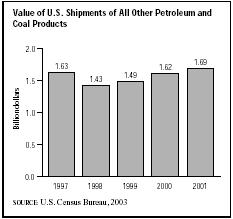SIC 2999
PRODUCTS OF PETROLEUM AND COAL, NOT ELSEWHERE CLASSIFIED
This category includes establishments primarily engaged in manufacturing packaged fuel, powdered fuel, and other products of petroleum and coal not elsewhere classified. Products in this industry include calcined petroleum coke, regular petroleum coke, fireplace logs, fuel briquettes, or petroleum waxes, independently of petroleum refineries.
NAICS Code(s)
324199 (All Other Petroleum and Coal Products Manufacturing)
Plummeting crude oil prices in the late 1990s adversely affected this industry, which relies on oil as the source for petroleum production. On September 29, 1998, crude oil futures closed on the New York Mercantile Exchange at $15.98 per barrel, as compared to one year earlier, when it closed at $21.18 per barrel. The price had bottomed out in late 1997, falling to $11.58 per

barrel. Whereas these low oil prices translated into cheap gasoline for consumers, it spelled trouble for this industry. Several events in the early 2000s, including the September 11,2001 terrorist attacks, had an effect on crude oil prices, which fluctuated dramatically during this time period. By 2003, crude oil prices were hovering between $31 and $33 per barrel.
This small composite industry shipped $1.697 billion worth of products in 2001, a substantial increase over 1998 shipments of $1.436 billion, but not much more than 1997 shipments of $1.63 billion, according to the U.S. Census Bureau. Exports account for nearly one-third of the industry's output. In the early 2000s, approximately 75 establishments employing a total of 3,198 workers comprised the miscellaneous petroleum and coal products industry. More than 50 percent of production was concentrated in the states of Louisiana, Texas, California, and Pennsylvania.
Raw materials for companies grouped in this area are procured from petroleum refineries or coal processors, and the goods produced are shipped either to distributors for the retail market or to other manufacturers. Solid packaged fuels, including fireplace logs and fuel briquettes produced by companies, are sold for general consumer use.
Petroleum waxes and coke are often lucrative side businesses generated by such leading U.S. oil refineries as ExxonMobil Corporation and Royal Dutch Shell Group of Companies, which acquired Pennzoil Company in the early 2000s. These firms are classified under SIC 2911: Petroleum Refining. Smaller firms that are primarily classified in this industry hold a relatively small market compared to the oil giants. Niche markets that demand specialty wax applications, however, require blending capacities that are regarded as too costly for major refiners to install and maintain.
Industry leaders include New York City-based Schlumberger Ltd., with $13.8 billion in 2003 sales; Salt Lake City-based Questar Corp., with $1.4 billion in 2003 sales; and Houston, Texas-based Apache Corp., with $4.1 billion in 2003 sales.
Petroleum Coke. A by-product generated from the thermal cracking of reduced crudes and residuums, coke serves as a domestic and industrial fuel. In its refined form, petroleum coke is used primarily for heating in the eastern United States, where most of its manufacturers are based. This fuel is also used in aluminum anodes, furnace electrodes and liners, carbonaceous pastes and cements, as well as various carbon and graphite products. Highly purified graphite derived from petroleum coke can be used for construction materials in nuclear plants. In 2001, petroleum coke accounted for 31.4 percent of this industry's shipments.
Petroleum Waxes. In general, waxes made up roughly 20 percent of industry production during the 1990s. These waxes, which include paraffin wax and petrolatum, are used primarily in paper manufacturing; both the manufacture of paper and the coating and impregnating of paper and paperboard for protective wrapping of foods require petroleum wax. In the manufacture of rubber tires, petroleum waxes serve as an anti-ozonant, while in PVC manufacturing, the waxes serve as internal lubricant. Paraffin wax is used in making candles, cosmetics, and pharmaceuticals. After increased imports in the late 1990s began to undermine U.S. manufacturing efforts, several petroleum wax makers shuttered operations and reduced capacity. In fact, between 1995 and 2001, U.S. capacity for petroleum wax declined 27 percent to $2.5 billion. According to a 2001 issue of Chemical Market Reporter , "After a series of plant shutdowns over the past three years, US producers of petroleum wax are planning more closures this year. Declining demand for domestic petroleum wax, particularly in the candles and packaging markets, is behind the plant rationalizations. Sales to the paper and packaging markets are being hurt by the slowing US paper markets, while low-cost imports further penetrate the candles market."
Further Reading
Infotrac Company Profiles. 7 January 2000. Available from http://web4.infotrac.galegroup.com .
U.S. Census Bureau. "Statistics for Industry Groups and Industries: 2000." February 2002. Available from http://www.census.gov/prod/2002pubs/m00as-1.pdf .
——. "Value of Shipment for Product Classes: 2001 and Earlier Years." December 2002. Available from http://www.census.gov/prod/2003pubs/m01as-2.pdf .
"U.S. Petroleum Wax Market Hurt By Slowing Economy and Imports." Chemical Market Reporter, 23 April 2001.
Comment about this article, ask questions, or add new information about this topic: